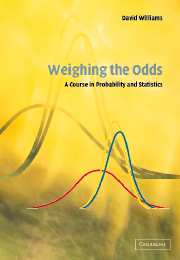Book contents
- Frontmatter
- Contents
- Preface
- 1 Introduction
- 2 Events and Probabilities
- 3 Random Variables, Means and Variances
- 4 Conditioning and Independence
- 5 Generating Functions; and the Central Limit Theorem
- 6 Confidence Intervals for one-parameter models
- 7 Conditional pdfs and multi-parameter Bayesian Statistics
- 8 Linear Models, ANOVA, etc
- 9 Some further Probability
- 10 Quantum Probability and Quantum Computing
- Appendix A Some Prerequisites and Addenda
- Appendix B Discussion of some Selected Exercises
- Appendix C Tables
- Appendix D A small Sample of the Literature
- Bibliography
- Index
Appendix D - A small Sample of the Literature
Published online by Cambridge University Press: 05 June 2012
- Frontmatter
- Contents
- Preface
- 1 Introduction
- 2 Events and Probabilities
- 3 Random Variables, Means and Variances
- 4 Conditioning and Independence
- 5 Generating Functions; and the Central Limit Theorem
- 6 Confidence Intervals for one-parameter models
- 7 Conditional pdfs and multi-parameter Bayesian Statistics
- 8 Linear Models, ANOVA, etc
- 9 Some further Probability
- 10 Quantum Probability and Quantum Computing
- Appendix A Some Prerequisites and Addenda
- Appendix B Discussion of some Selected Exercises
- Appendix C Tables
- Appendix D A small Sample of the Literature
- Bibliography
- Index
Summary
These days, there are so many brilliant young (and youngish) probabilists and statisticians around that I am not going to single any out. Tributes to people who helped develop the fields are more ‘classical’. But, of course, many of the books mentioned are modern.
The Bibliography is fairly extensive, though still a small fraction of what it could/should have been. For everyone, there are many books in the Bibliography of great interest. And for those determined to strive, to seek, to find, but not to yield, the Bibliography contains – for inspiration – some books and papers (several of which were mentioned in the main text) which are at a significantly more advanced level than this book.
Probability
In the early days, Probability Theory was developed by Cardano, Galileo, Pascal, de Moivre, two Bernoullis, Bayes, Laplace, Gauss, Markov, Tchebychev. In the 20th century, the Measure Theory of Borel and Lebesgue allowed Borel, Wiener, Kolmogorov [140], Doob [66] and others to put Probability on a rigorous basis and to extend its scope dramatically. Lévy [151, 152] provided much of the intuition and inspiration.
Volume 1 of Feller's book [75], a little more challenging than this present one, will always hold a special place in the hearts of probabilists. It is quite challenging, and should perhaps be read after, or in conjunction with, this one. Pitman [184] is a good route-in as prerequisite for the Probability in this book, should you need one.
- Type
- Chapter
- Information
- Weighing the OddsA Course in Probability and Statistics, pp. 519 - 524Publisher: Cambridge University PressPrint publication year: 2001



